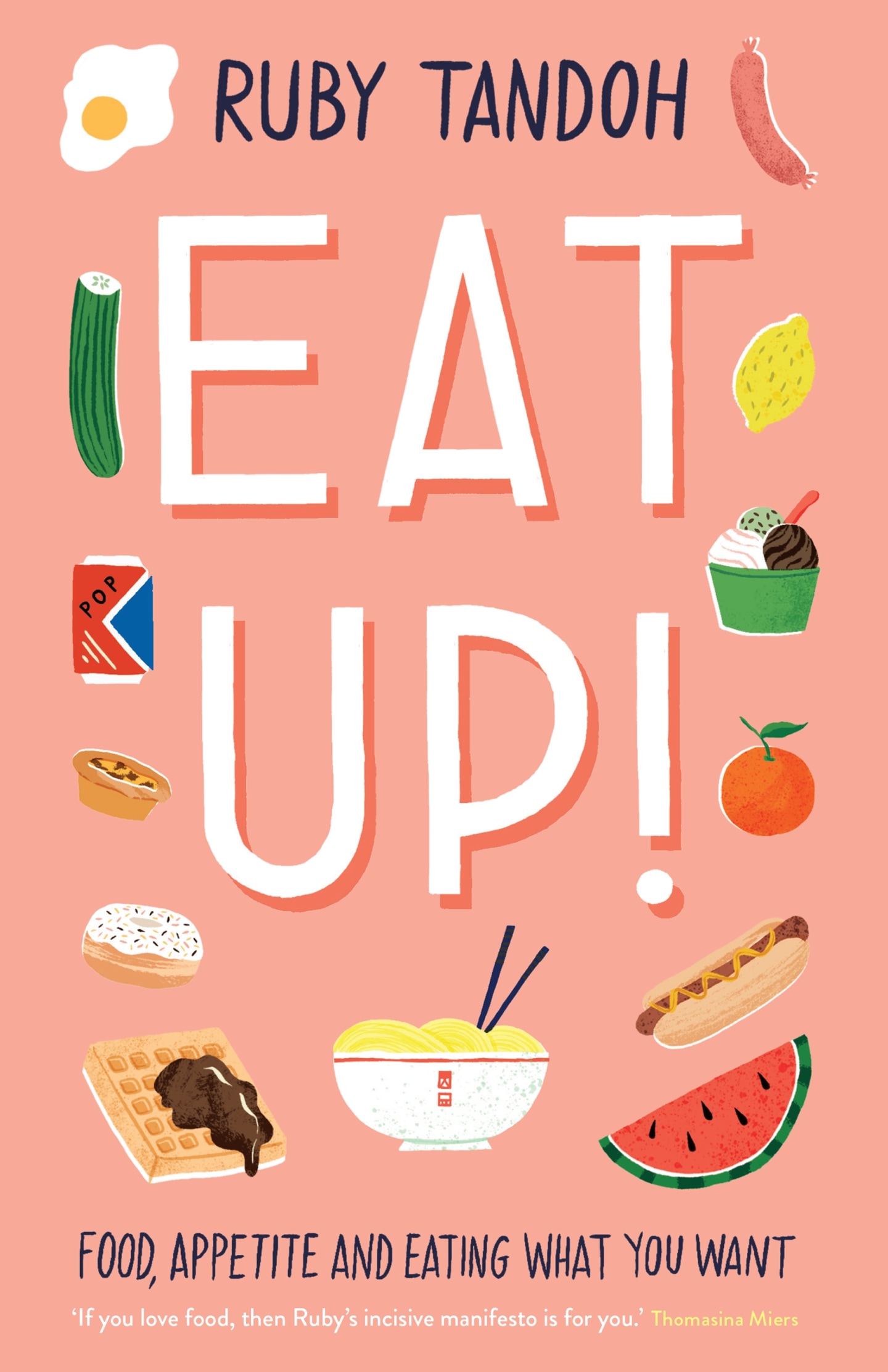Ruby Tandoh’s shame-free food manifesto is a revelation
Eat Up! proves food doesn’t have to be fancy to be meaningful.
 Ruby Tandoh
Courtesy Ruby Tandoh
Ruby Tandoh
Courtesy Ruby Tandoh
“I would like you to go down on me, and I want the last slice of the strudel.” That’s one characteristically pleasure-seeking sentence from Ruby Tandoh’s bold, breathtaking new food manifesto Eat Up! This new book from the British writer, and former Great British Bake Off finalist, aims to put the joy back into eating, at a cultural moment where many are anxiously obsessed with right and wrong ways to eat.
While reading the book, I was reminded of British screenwriter Julia Davis’s pitch-black comedy, Nighty Night. Specifically, a hilarious scene where the lead character, Jill, faces off with her neighbor over a plate of biscuits. “How many of those have you had, Sue?” Jill interrogates. “Two…,” Sue mumbles, through mortified mouthfuls. The scene is a send-up of Britain’s mannered white middle class, but it also makes an important point about the culture of shame that can surround food. For those who can afford to do so, eating to your heart’s content can often be frowned upon as indulgent excess (which in turn, may stem from fat-phobia). In Davis’s subversive take, Jill’s cruelty makes her the villain; Sue’s enjoyment of a chocolate cookie makes her far more likeable, and relatable. This refreshing message — to embrace food’s cheap and cheerful pleasures — permeates Eat Up! like ripples through dulce de leche ice cream.
Tandoh considers the “clean eating” goals of blogs like Goop, or Deliciously Ella, with sharp analysis. Writers for these sites champion a very specific version of wellness, preaching that sprouting your adzuki beans overnight is immeasurably more virtuous than warming up a tin of Heinz baked beans in the microwave. But it’s an inherently classist idea — not all of us have the time, money, or frankly the inclination to eat according to someone else’s rule book. But, as Tandoh affirms, we shouldn’t be stigmatized for it.

As a counterpoint, Tandoh finds delight in the too much. Her language jumps off the page. Amidst her personal memories and insights, Eat Up! is punctuated with recipes that sometimes feel more like whimsical suggestions than tutorials: early on in the book, Tandoh’s “Creme Egg ritual” proposes letting the bulbous candy roll around in your pocket all day, “just within grabbing distance of your greedy fingertips...Think about dipping your tongue into the sickly sweet fondant inside and deftly, explicitly, licking it out. Then, when the moment is right, eat.”
Tandoh feels like the kind of friend that you could invite over for a carefree evening of frozen pizza and cheap chardonnay. But she’s also aware of issues people may have around food, and the book references her own struggles with an eating disorder. Eat Up! also demonstrates her deep understanding in of the cultural, social, and racial history of food. For instance: chocolate was first popularized as a pious, Quaker alternative to the booze-soaked indulgence of Victorian culture. More darkly, Tandoh unsparingly details the colonial violence in south Asia made it possible for tea to arrive on British soil.
Some of the book’s most compelling moments are when Tandoh tackles how food intersects with her own identity, as a queer, British, mixed-race woman. There’s a touching story about her journey to better connect with her Ghanaian heritage through cooking her aunt Esther’s groundnut soup, and then customizing the recipe to better fit with her own life. “It works for mixed and muddled me,” Tandoh writes. That personal approach also feeds into her take on popular movies. The post-coital carbonara that Meryl Streep prepares in Heartburn is found to be loaded with burgeoning desire; Moonlight’s arroz con pollo stands for “the nourishing, emboldening reality of queer black love.” Tandoh delights in viewing pop culture through this new lens.
Food doesn’t have to be fancy to be meaningful. It doesn’t need to look good on a plate to be nourishing. At a time when “white foodie-dom” is gentrifying the humble pot of guacamole or bowl of pho far away from its origins, Tandoh’s book reminds you that a pack of instant ramen can be just as gratifying. And in a world where we’re constantly fed messages of aspirational eating that are beyond our means, Tandoh’s book is reassuringly realistic about the the way we live now. Since reading it, I’ve learned to take the time to enjoy each cheesy bite of mid-week pasta dinners, and to better savor the healing properties of a bar of cheap chocolate after a tough day. Life’s too short. Eat up!
